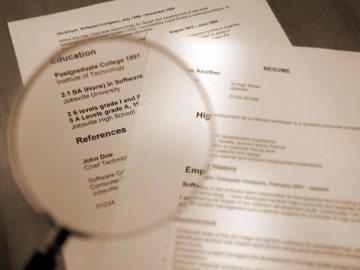Resume Credentials: What to Include to Boost Credibility

During job applications, your resume is the only basis for recruiters to determine whether you're a good fit. Your skills and work experience are primary considerations for employment, but it goes beyond that. Resumes are a test of character. What you put on yours should mirror your actual capabilities and experience.
Although credentials are essential, they're not the ultimate judge of your competencies. Being honest about what you can and can't do is key, so you must be careful in sharing details such as your academic background, work history, hard and soft skills, and the like.
Make sure you know how to list credentials in your resume.
What are Resume Credentials?
Resume credentials refer to pieces of information that indicate an individual's capacity to perform specific jobs or tasks. These include different qualifications, such as the following:
- University degrees or diplomas
- Licenses
- Certifications
Resume credentials and your greatest skillsets are vital for your resume because they show employers which job is suitable for you.
It's one thing to meet all the job qualifications an employer is looking for; it's another to have extra credentials that make you a cut above the rest. With these, you provide yourself with a competitive advantage over other applicants.
What to Include on Your Resume
If you want to know how to list credentials in your resume, here are five credentials you should discuss:
-
Relevant academic achievements
There's nothing wrong with sharing academic achievements on your resume. Just make sure to discuss relevant awards. If you're applying for a sales head position, mention a successful business project you managed in college. Be specific by sharing your total earnings, the number of products sold, and other roles you handled for that project.
Doing this shows recruiters or employers your knowledge, competencies, and dedication to becoming better at sales. This way, you increase your chances of landing that sales role.
-
Results-focused responsibilities
Soft skills are necessary for all jobs, but you should emphasize how your hard skills helped you achieve assigned tasks. One of the ways how to list credentials in your resume is by sharing your primary responsibilities and how you were able to drive results.
Were you able to drive high sales consistently? What were the most successful marketing campaigns you ran? Concrete examples of accomplishments help recruiters gauge your ability to handle projects.
-
Internships
Internships are great ways to gain work experience, especially for students. They allow you to learn about specific fields of work, provide firsthand experience, and add to your personal growth.
As you go through your internship, you become more familiar with your chosen field and pick up relevant skills. For some, this is the closest they can get to formal work experience.
Successful internships lead to job offers or letters of recommendation. You could accept a role from the company you interned for or search for others.
Once you start looking for jobs, another way how to list credentials in your resume is by listing your internship experience, contributions, and all skills acquired on your resume. These details will tell recruiters you're ready to take on work for a specific role.
-
Side projects
Side projects may be small, but they're beneficial in learning new skills with minor risks. They enhance your work performance through increased productivity and creativity. There are various side projects, such as creating digital art, developing apps, and many more.
If you've gained skills in digital art and are applying for a graphics design role, enumerate the artworks you've created and your best art skills. Companies will be interested in knowing how you became a digital artist and possibly hire you if your skills meet their standards.
-
Volunteer work
Work ethics is one thing, and so is going the extra mile. Volunteer work is one way to show that you have a h3 sense of initiative. From environmental conservation to community service, there are several options for volunteer work.
Aside from appropriate skills and experience, companies also look at your character, which reflects in your volunteer work.
Stay True to Get Through
There's more to your resume than skills and experience. Resume credentials are vital, but lying about them leads to a short-lived career. People get fired for pretending they hold degrees or diplomas, so make sure to know how to list credentials in your resume truthfully.
With Career.com, you'll find nothing but credible job opportunities waiting for you.


